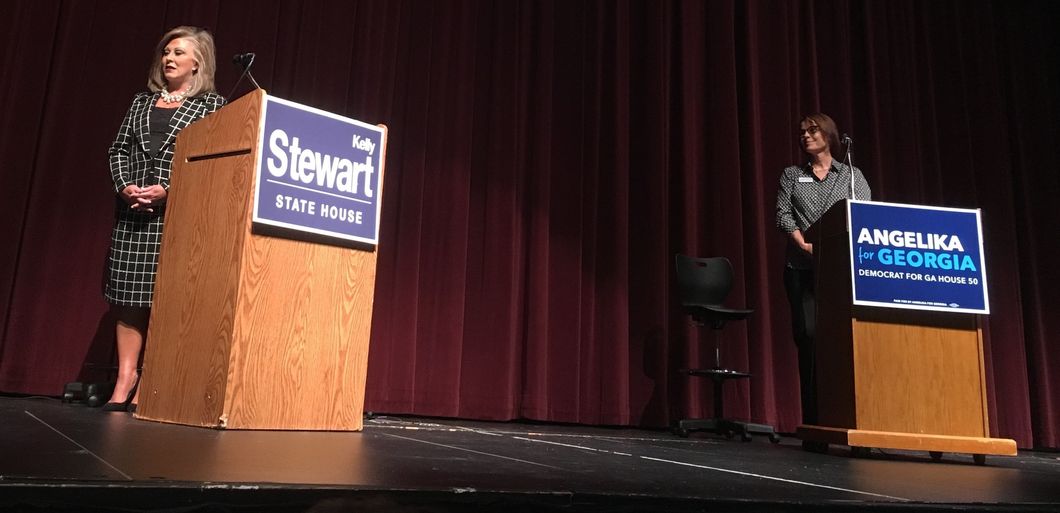Given my age (almost 16 and a half!) and my nonpartisan perspective on most issues, it's rare that I attend any politically motivated function (much less in person). Unfortunately, my first taste of official political discourse only encapsulated everything I dislike about American politics.
Upon learning that my high school was hosting a debate between two candidates for the district's representative position, I was immediately intrigued. Admittedly, I had my expectations set high. I had jotted down "House Rep. Debate" on my calendar a week in advance and marked off the days the event neared. I would finally get to learn firsthand about the issues affecting my community and about the people with plans to fix them.
To a certain extent I got what I had hoped for, but certainly not in the environment I had anticipated.
When the student moderators introduced the candidates, Democrat Angelika Kausche and Republican Kelly Stewart, to the stage, it was already abundantly clear how ideologically distinct the two opponents would be.
The first question, which asked each candidate to describe how their views aligned with their party's platform, revealed just how cut-and-dry the candidates were at representing their respective factions. On the left, an unwavering conservative with a keen avoidance of overspending and socialist policies. On the right, an equally grounded liberal with a passion for tackling humanitarian injustices and enforcing moral correctness.
This circumstance certainly isn't unprecedented, but the rest of the night only proved how their narrow-minded partisan loyalty served as barriers to productive discourse.
Right off the bat, Kausche avoided the clearly stated question by taking the time to thank the John's Creek Community Association for hosting the event.
Stewart, however, dove right into her response, which turned out to be a fine-tuned diatribe about Georgia's budgetary deficit and Kausche's supposed lack of budgetary experience and the budgetary concerns and the budget. Finally, Stewart concluded that perhaps the most important thing to consider is, you guessed it, the budget. She even printed out budget sheets for attendees, which I found extraordinarily useful as a handy notepad.
My head perked up when I heard a question regarding Georgia's healthcare policies. Admittedly, I know less than I should about the subject and was curious to know what each candidate thought.
Shockingly, Republican Kelly Stewart opposed the expansion of Medicaid while Democrat Angelika Kausche vehemently supported it. I start to wonder what the point of having candidates' names on the ballot is when their political stances just as much could be conveyed with the letters "D" and "R" to the tee.
Neither candidate veered from their party platform for the rest of the night, with only a few moments of forced agreement (always around the fact that an issue exists, never about how to solve it). On a few occasions, a candidate would utter an especially radical idea (i.e. Obamacare is at blame for the opioid crisis. Medicaid should be for all people. Teachers should be armed.) and was almost always met with either overwhelming applause or a sea of groans.
The room's reaction was so powerful in either candidate's favor that I was genuinely confused who was the more favored of the two.
To be abundantly clear, I wholeheartedly support voter efficacy and staying informed, and I understand that debates inform voters of their representative's ideals. I also don't mean to criticize Kausche or Stewart or even the policies they endorse. I only question the point of debate when it's anchored in stiff, unrelenting party platforms. This is symptomatic of the larger trend at work in American politics: the exploitation of party differences by politicians to entice a demographic of their constituents.
If you're wondering what that means or demand evidence, just take President Trump. Back in 2016, his presidential campaign threatened to run as independent when he felt he wasn't getting enough support from the GOP. Now, he champions radicalized views of the right and has emboldened members of the far-right (along with alt-right neo-Nazis and racists) with his entirely anti-PC attitude.
Similarly, it's rare to find a democratic politician that deviates from the extensive list of liberal ideas that are expected of them. Consider Trump's opponent Hilary Clinton, who originally made it clear in 2014 that she was against nationwide legalization of same-sex marriage. Isn't it suspicious that in 2015, without explaining why her stance changed, her presidential campaign later advocated for this right, thus garnering support from the LGBT community?
There's so much more wrong with the state of American politics than your opposed party controlling political office.
The effect of the American people allowing this pandering and doublespeak is political inaction among policymakers, who can preach a set of ideals independent of their actual intentions.
The other result is voter apathy among constituents, who therefore feel their vote holds little weight.
With such deceitful rhetorical tactics dominating the political sphere, it's easy to believe that we've all been given a voice. But when that voice only ever tells us what we want to hear, it's important that we stop to question whether we're really being heard.

















